Fat Replacer Market
Fat Replacer Market Size and Share Forecast Outlook 2025 to 2035
Fat replacer market is projected to grow from USD 3.0 billion in 2025 to USD 4.4 billion by 2035, at a CAGR of 3.9%. Carbohydrate-based will dominate with a 46.0% market share, while bakery will lead the application segment with a 33.9% share.
Fat Replacer Market Forecast and Outlook 2025 to 2035
The global fat replacer market is valued at USD 3.0 billion in 2025 and is slated to reach USD 4.4 billion by 2035, recording an absolute increase of USD 1.4 billion over the forecast period. This translates into a total growth of 46.7%, with the market forecast to expand at a compound annual growth rate (CAGR) of 3.9% between 2025 and 2035.
The overall market size is expected to grow by nearly 1.5X during the same period, supported by increasing health consciousness, growing demand for low-fat products, and rising adoption of clean-label ingredients across diverse food manufacturing and healthy food applications.
Quick Stats for Fat Replacer Market
- Fat Replacer Market Value (2025): USD 3.0 billion
- Fat Replacer Market Forecast Value (2035): USD 4.4 billion
- Fat Replacer Market Forecast CAGR: 3.9%
- Leading Type in Fat Replacer Market: Carbohydrate-based (46.0%)
- Key Growth Regions in Fat Replacer Market: North America, Europe, and Asia Pacific
- Key Players in Fat Replacer Market: Tate & Lyle, Ingredion, Kerry, IFF, DSM-Firmenich, Corbion
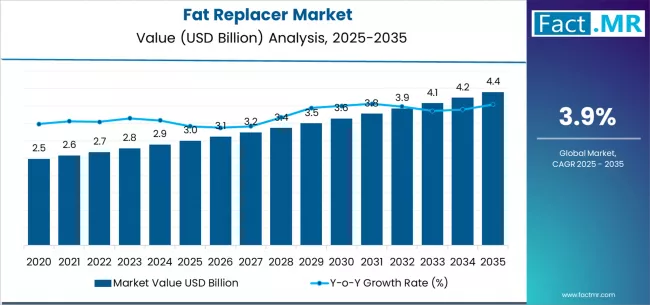
Between 2025 and 2030, the fat replacer market is projected to expand from USD 3.0 billion to USD 3.6 billion, resulting in a value increase of USD 0.6 billion, which represents 42.9% of the total forecast growth for the decade. This phase of development will be shaped by increasing health-conscious consumption, rising clean-label demand, and growing adoption of functional ingredient solutions in food manufacturing operations. Producers are expanding their processing capabilities to address the growing demand for healthier food formulations and enhanced nutritional profiles.
Fat Replacer Market Key Takeaways
| Metric | Value |
|---|---|
| Estimated Value in (2025E) | USD 3.0 billion |
| Forecast Value in (2035F) | USD 4.4 billion |
| Forecast CAGR (2025 to 2035) | 3.9% |
From 2030 to 2035, the market is forecast to grow from USD 3.6 billion to USD 4.4 billion, adding another USD 0.8 billion, which constitutes 57.1% of the overall ten-year expansion. This period is expected to be characterized by the expansion of clean-label formulation systems, the integration of advanced processing technologies, and the development of enhanced functional solutions for major food manufacturers. The growing adoption of health positioning programs and efficient formulation initiatives will drive demand for fat replacers with enhanced functionality standards and improved consumer acceptance profiles.
Between 2020 and 2025, the fat replacer market experienced steady recovery growth, driven by increasing health consciousness and growing recognition of fat replacers as essential ingredients for healthy food manufacturing and calorie-reduction applications.
The market developed as food manufacturers and health-focused brands recognized the potential for these products to enhance nutritional profiles while maintaining taste quality and improving consumer appeal.
Technological advancement in ingredient processing and formulation systems began emphasizing the critical importance of maintaining product functionality and operational efficiency in healthy food production operations.
Why is the Fat Replacer Market Growing?
Market expansion is being supported by the increasing global health consciousness and the corresponding need for functional ingredients that can reduce caloric content while supporting diverse food manufacturing applications across various health-focused consumer environments.
Modern food manufacturers and health brands are increasingly focused on implementing ingredient solutions that can enhance nutritional profiles, maintain taste satisfaction, and provide consistent performance in healthy food processing operations.
Fat replacers' proven ability to deliver calorie reduction benefits, versatile processing capabilities, and diverse application potential make them essential components for contemporary health-focused manufacturing operations and nutritional enhancement solutions.
The growing emphasis on health and wellness and clean-label consumption is driving demand for fat replacers that can support healthy formulations, improve nutritional positioning, and enable efficient processing operations across varying food manufacturing configurations.
Consumer preference for ingredients that combine health benefits with taste maintenance and functional reliability is creating opportunities for innovative formulation implementations.
The rising influence of obesity concerns and dietary optimization trends is also contributing to increased adoption of fat replacers that can provide advanced nutritional benefits without compromising taste quality or processing efficiency.
Opportunity Pathways - Fat Replacer Market
The fat replacer market is poised for steady growth and transformation. As food manufacturers and health brands across both developed and emerging markets seek functional ingredients that are effective, clean-label, versatile, and health-beneficial, fat replacer systems are gaining prominence not just as formulation components but as strategic elements for health positioning, calorie reduction, nutritional enhancement, and consumer appeal.
Rising health consciousness and clean-label demand in North America, Europe, and Asia Pacific amplify demand, while producers are picking up on innovations in ingredient technologies and functionality enhancement methods.
Pathways like clean-label solutions, advanced functionality, and specialized applications promise moderate margin uplift, especially in developed markets. Geographic expansion and application diversification will capture volume, particularly where health-conscious consumption is growing or functional food infrastructure requires development. Quality pressures around functionality standards, processing efficiency, clean-label credentials, and consumer acceptance give structural support.
- Pathway A - Clean-Label & Natural Solutions. Health-conscious consumers increasingly require ingredients that meet clean-label standards and natural applications. Producers who specialize in natural formulations or enhance clean-label capabilities can command a premium. Expected revenue pool: USD 308.0-370.0 million
- Pathway B - Advanced Functionality & Performance. Enhanced ingredient systems -- improved texture delivery, advanced functionality, taste optimization -- improve product performance and consumer acceptance. Opportunity: USD 246.0-298.0 million
- Pathway C - Health Brand Integration. Direct partnerships with health-focused brands, customized specifications, and nutritional support optimize supply chain efficiency and enhance customer relationships. Systems with stronger integration capabilities will allow premium positioning. Revenue lift: USD 193.0-246.0 million
- Pathway D - Specialized Application Development. Extending reach into functional food applications, weight management uses, and premium health markets. Industries will look for ingredient suppliers who provide effective, health-beneficial solutions. Pool: USD 174.0-228.0 million
- Pathway E - Emerging Market Expansion. Steady growth in developing health markets, urbanization trends, and healthy food development. Local partnerships and processing facilities help penetration. Expected upside: USD 154.0-193.0 million
- Pathway F - Technical Support Services. Application services, formulation support, and nutritional optimization help manufacturers ensure product specifications and consumer acceptance. Service approaches benefit from long-term relationships. USD 108.0-140.0 million
- Pathway G - Sustainable Processing Solutions. Processing efficiency, natural sourcing, and sustainable formulation create competitive advantages and environmental benefits. Pool: USD 93.0-123.0 million
Segmental Analysis
The market is segmented by type, application, and claim. By type, the market is divided into carbohydrate-based, protein-based, and fat-based. By application, it covers bakery, dairy, and savory/others. By claim, it is segmented into calorie-reduction, clean-label, and others. Regionally, the market is divided into North America, Europe, Asia Pacific, Latin America, and Middle East & Africa.
By Type, the Carbohydrate-Based Segment Accounts for 46.0% Market Share
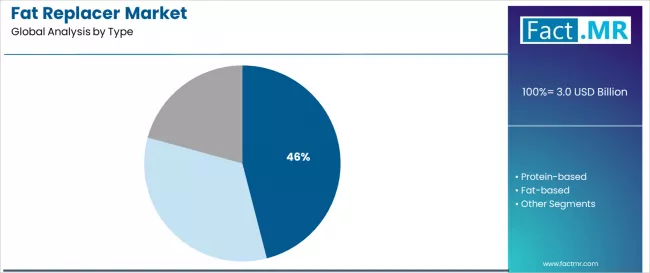
The carbohydrate-based type is projected to account for 46.0% of the fat replacer market in 2025, reaffirming its position as the leading ingredient category. Food manufacturers and health brands increasingly utilize carbohydrate-based replacers for their established functionality properties, proven processing compatibility, and reliable performance across bakery applications, dairy formulations, and food manufacturing applications.
Carbohydrate-based type's established modification procedures and consistent performance output directly address the industry requirements for reliable fat reduction and processing efficiency in diverse manufacturing environments.
Carbohydrate-based fat replaces form the foundation of current market operations, as it represents the technology with the greatest functionality versatility and established processing infrastructure across multiple applications and manufacturing scenarios. Producer investments in enhanced processing methods and functionality optimization continue to strengthen adoption among food and health companies.
With manufacturers prioritizing functionality effectiveness and processing reliability, carbohydrate-based operations align with both performance objectives and manufacturing efficiency requirements, making them the central component of comprehensive fat replacer strategies.
By Application, the Bakery Segment Accounts for 33.9% Market Share
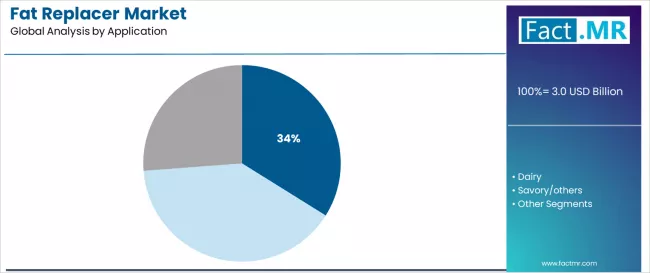
Bakery applications are projected to represent 33.9% of fat replacer consumption in 2025, underscoring their critical role as a primary application requirement for healthy baking and low-fat product development. Bakery manufacturers prefer fat replacers for their texture maintenance, processing versatility, and ability to provide consistent quality while supporting calorie reduction and health positioning requirements.
Positioned as essential ingredients for modern healthy baking, bakery applications offer both functional advantages and health benefits. The segment is supported by continuous innovation in bakery formulation and the growing availability of specialized ingredient methods that enable diverse applications with enhanced texture capabilities.
Manufacturers are investing in formulation optimization to support product differentiation and health positioning delivery. As healthy baking becomes more prevalent and calorie-reduction requirements increase, bakery applications will continue to represent a significant portion of the application market while supporting advanced health positioning and consumer satisfaction strategies.
By Claim, the Calorie-Reduction Segment Accounts for 52.0% Market Share
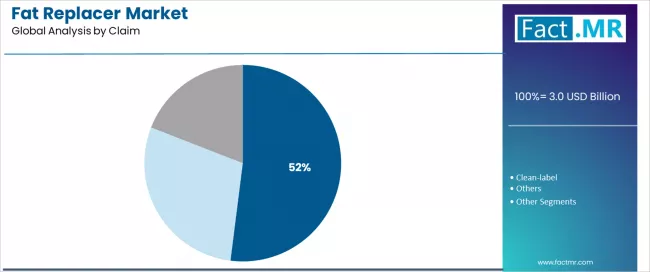
Calorie-reduction claims are projected to represent 52.0% of fat replacer positioning in 2025, underscoring their critical role as the primary claim requirement for health-focused food positioning and weight management applications. Health-conscious consumers prefer calorie-reduction claims for their health benefits, weight management support, and ability to provide nutritional advantages while supporting dietary goals and wellness requirements.
Positioned as essential claim for modern healthy food consumption, calorie-reduction offers both health advantages and consumer benefits. The segment is supported by continuous innovation in nutritional formulation and the growing availability of specialized claim methods that enable enhanced health positioning with improved consumer appeal.
Brands are investing in claim optimization to support health positioning and consumer engagement delivery. As health consciousness becomes more prevalent and calorie management requirements increase, calorie-reduction claims will continue to dominate the claim market while supporting advanced health positioning and consumer wellness strategies.
What are the Drivers, Restraints, and Key Trends of the Fat Replacer Market?
The fat replacer market is advancing steadily due to increasing health consciousness and growing adoption of functional ingredients that provide calorie reduction and nutritional enhancement across diverse healthy food applications.
However, the market faces challenges, including taste and texture considerations, processing complexity costs, and varying consumer acceptance across different food environments. Innovation in ingredient formulation and processing technologies continues to influence product development and market expansion patterns.
Rising Health Consciousness and Obesity Concerns
The growing expansion of health-focused consumption and obesity awareness is enabling producers to develop fat replacers that provide superior calorie reduction, maintained taste satisfaction, and reliable functional performance in healthy food environments.
Advanced ingredient systems provide improved functionality while allowing more effective calorie reduction and consistent quality across various applications and consumption requirements. Producers are increasingly recognizing the competitive advantages of health-focused ingredient capabilities for market positioning and health-conscious consumer targeting.
Clean-Label Innovation and Functionality Enhancement Drive Product Development
Modern fat replacer producers are incorporating natural ingredient methods and functionality systems to enhance product performance, improve consumer acceptance, and ensure consistent delivery to food manufacturers and health brands.
These technologies improve functionality standards while enabling new applications, including clean-label formulations and premium health products. Advanced ingredient integration also allows producers to support premium product positioning and health optimization beyond traditional ingredient supply.
Analysis of the Fat Replacer Market by Key Countries
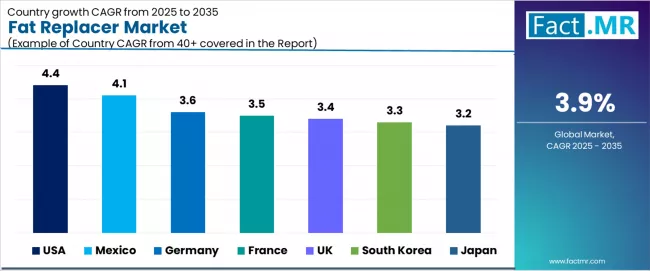
| Country | CAGR (2025-2035) |
|---|---|
| USA | 4.4% |
| Mexico | 4.1% |
| Germany | 3.6% |
| France | 3.5% |
| UK | 3.4% |
| South Korea | 3.3% |
| Japan | 3.2% |
The fat replacer market is experiencing steady growth globally, with the USA leading at a 4.4% CAGR through 2035, driven by extensive health consciousness expansion, advanced food processing infrastructure investments, and significant adoption of healthy food technologies. Mexico follows at 4.1%, supported by growing health awareness development, rapid healthy food modernization, and growing adoption of functional ingredient systems.
Germany shows growth at 3.6%, emphasizing quality standards and health food capabilities. France and UK record steady growth, focusing on health market development and clean-label optimization. South Korea demonstrates 3.3% growth, supported by health trends and functional food adoption. Japan demonstrates 3.2% growth, supported by health consciousness but constrained by market maturity.
The report covers an in-depth analysis of 40+ countries; seven top-performing countries are highlighted below.
United States Demonstrates Health Food Innovation
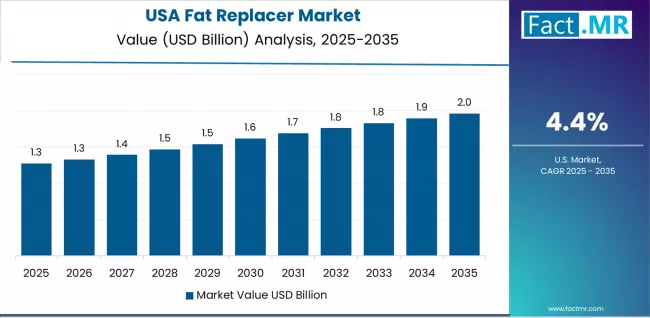
The U.S. market emphasizes advanced ingredient features, including precision functionality control and integration with comprehensive health food platforms that manage calorie optimization, clean-label delivery, and nutritional applications through unified ingredient systems. The country demonstrates strong growth at 4.4% CAGR, driven by health consciousness expansion, clean-label demand, and emerging functional food applications that support ingredient system integration. American food manufacturers prioritize health effectiveness with fat replacers delivering consistent functional performance through advanced processing capabilities and specialized health adaptation.
Technology deployment channels include major food processors, specialized health ingredient suppliers, and wellness industry procurement programs that support professional applications for complex healthy food manufacturing and nutritional enhancement applications. Health food platform integration capabilities with established wellness systems expand market appeal across diverse manufacturing requirements seeking health benefits and functional performance. The resilient health sector and expanding healthy food capacity additions create sustained demand, while innovative applications in weight management products open new growth avenues.
Performance Metrics:
- Health food facilities in California, New York, and Illinois leading fat replacer adoption for healthy food applications
- Specialty health ingredient retail channels maintaining 69% market share for complex health food integration applications
- Wellness programs supporting 37% of ingredient acquisitions across health and food facilities
- Health food platform compatibility with major wellness systems driving procurement selection criteria
Mexico Maintains Health Market Growth
Mexico's expanding health market demonstrates sophisticated fat replacer adoption with documented functional effectiveness in food applications and health product manufacturing through integration with existing food systems and health infrastructure. The country leverages growing health awareness and functional food integration to maintain strong growth at 4.1% CAGR. Health centers, including Mexico City, Guadalajara, and Monterrey, showcase premium applications where ingredient systems integrate with comprehensive health platforms and wellness management systems to optimize functionality and health effectiveness.
Mexican health companies prioritize calorie reduction solutions and functional food quality in fat replacer development, creating demand for premium ingredient systems with advanced features, including health optimization integration and functional food systems. The market benefits from established health infrastructure and a willingness to invest in functional food technologies that provide long-term health benefits and compliance with international wellness and dietary standards. Premium health applications, functional food systems, and wellness programs drive diversified demand across multiple end-use segments.
Market Intelligence Brief:
- Health market focuses on calorie reduction and functional food compliance, driving premium segment growth
- Health partnerships providing 40% faster development cycles
- Technology collaboration between Mexican health companies and international ingredient manufacturers
- Wellness training programs expanding fat replacer system integration in health and dietary scenarios
Germany Emphasizes Quality Excellence
Germany demonstrates steady market development with a 3.6% CAGR, distinguished by food manufacturers' preference for high-quality fat replacers that integrate seamlessly with existing health food systems and provide reliable long-term functional performance in specialized health applications. The market prioritizes advanced features, including precision functionality control, processing durability, and integration with comprehensive health platforms that reflect German industry expectations for ingredient sophistication and functional excellence.
Growth drivers encompass health food optimization applications, expanding wellness requirements, and advanced functional system integration. German manufacturers emphasize quality control systems and comprehensive functional documentation that align with domestic health standards. The convergence of advanced ingredient technology, health food industry presence, and traditional quality heritage creates diversified demand across multiple application segments.
Market Characteristics:
- Premium focus on carbohydrate-based systems with advanced functionality capabilities and precision health features
- Integration requirements with existing health food and wellness platforms
- Emphasis on functional reliability and long-term health benefits in food applications
France Shows Health Food Development
France demonstrates steady expansion at 3.5% CAGR through diversified demand from health programs, wellness activities, and specialty food projects. Major health hubs in regions throughout the country drive fat replacer adoption for health food and specialty wellness production. Health heritage and wellness programs create sustained market demand, while specialty and premium applications provide additional growth opportunities. Consumer preference for functional ingredients and health sophistication supports consistent market development.
Market Characteristics:
- Strong health heritage and established wellness culture supporting premium positioning
- Advanced specialty food and health sectors driving demand for high-quality functional ingredients
- Health positioning capabilities and wellness market presence supporting diversified revenue streams
United Kingdom Demonstrates Health Innovation
The U.K. market maintains steady growth at 3.4% CAGR, driven by health modernization, wellness development, and functional food applications. British health facilities and food companies are implementing advanced fat replacer systems to enhance nutritional capabilities and support health operations that align with wellness regulations and quality standards. Market expansion benefits from health programs that mandate ingredient performance capabilities in functional food specifications, creating sustained demand where nutritional flexibility and health compliance represent critical requirements.
Strategic Market Indicators:
- Health and wellness facilities leading adoption with functional food modernization programs requiring advanced fat replacer systems
- Health programs providing regulatory support for advanced ingredient system acquisition
- Quality compliance requirements driving demand for certified systems with health operational compatibility
- Specialized functional food and wellness segments adopting comprehensive fat replacer solutions for health optimization
Japan Shows Technology-Focused Development
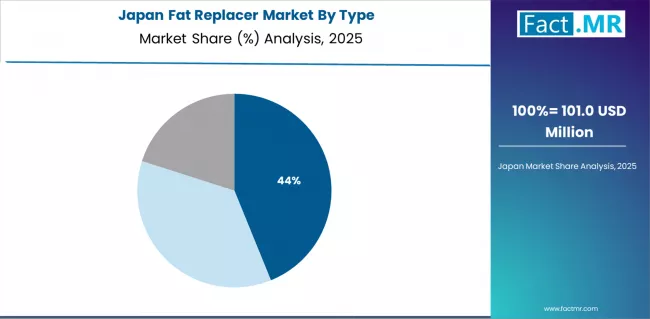
Japan maintains steady expansion at 3.2% CAGR, distinguished by food manufacturers' preference for high-quality fat replacers that integrate seamlessly with existing health food systems and provide reliable long-term functional performance in specialized wellness applications.
The market prioritizes advanced features, including precision functionality control, processing quality, and integration with comprehensive health platforms that reflect Japanese industry expectations for ingredient sophistication and functional excellence.
High-specification health food and wellness applications drive demand, supported by advanced ingredient research and development initiatives. Japanese manufacturers emphasize ingredient purity, consistent performance characteristics, and comprehensive functional documentation that aligns with stringent health standards. The focus on advanced applications and functional excellence supports stable growth despite market maturity.
Market Characteristics:
- Technology focus on clean-label systems with advanced functionality capabilities and precision health features
- Integration requirements with existing health food and wellness platforms
- Emphasis on functional reliability and long-term health benefits in food applications
South Korea Emphasizes Health Innovation
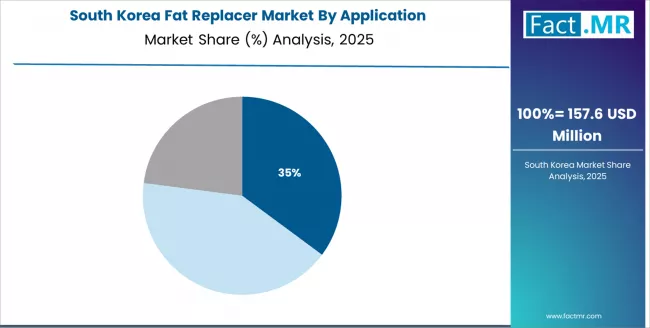
South Korea maintains steady development at 3.3% CAGR through health expansion, functional food growth, and wellness applications. Korean health facilities and food companies are implementing advanced fat replacer systems to enhance nutritional capabilities and support health operations that align with wellness regulations and quality standards.
Market expansion benefits from government health programs that mandate ingredient performance capabilities in functional food specifications, creating sustained demand where nutritional flexibility and health compliance represent critical requirements.
Strategic Market Indicators:
- Health and wellness facilities leading adoption with functional food modernization programs requiring advanced fat replacer systems
- Government health programs providing regulatory support for advanced ingredient system acquisition
- Health compliance requirements driving demand for certified systems with international wellness compatibility
- Specialized functional food and health segments adopting comprehensive fat replacer solutions for wellness optimization
Europe Market Split by Countries
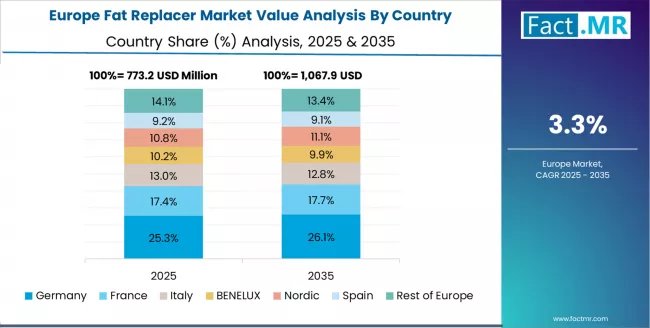
The fat replacer market in Europe is projected to grow from USD 900.0 million in 2025 to USD 1.32 billion by 2035, registering a CAGR of 3.9% over the forecast period. Germany is expected to maintain its leadership position with a 30.4% market share in 2025, increasing to 30.9% by 2035, supported by its advanced health food infrastructure, comprehensive wellness capabilities, and major processing facilities serving European and international markets.
France follows with a 23.8% share in 2025, projected to reach 24.2% by 2035, driven by established health heritage, wellness programs, and food sophistication, supported by growing functional food trends. United Kingdom holds a 20.7% share in 2025, expected to reach 21.1% by 2035, supported by health modernization and wellness development. Netherlands commands a 12.6% share in 2025, projected to reach 12.4% by 2035, while Spain accounts for 8.9% in 2025, expected to reach 8.7% by 2035. The Rest of Europe region is anticipated to maintain momentum, with its collective share from 3.6% to 2.7% by 2035, attributed to increasing health consciousness development across Eastern European countries and growing functional food adoption across various European markets implementing wellness programs.
Competitive Landscape of the Fat Replacer Market
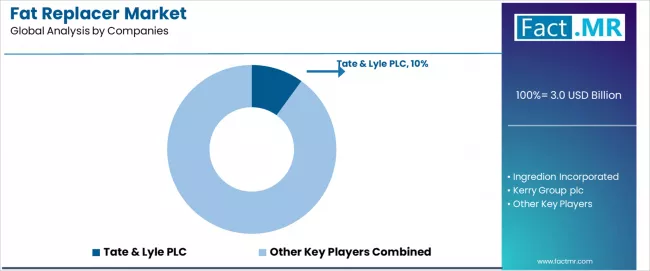
The fat replacer market is characterized by competition among established ingredient manufacturers, specialized functional ingredient companies, and integrated food ingredient producers.
Companies are investing in advanced ingredient research, functionality development, clean-label optimization, and comprehensive product portfolios to deliver effective, natural, and versatile fat replacer solutions. Innovation in ingredient functionality, processing technologies, and application development capabilities is central to strengthening market position and competitive advantage.
Tate & Lyle leads the market with a 10.0% market share, offering specialized ingredient production with a focus on functionality standards and advanced processing design for health food operations. Ingredion provides comprehensive ingredient portfolios with an emphasis on functional integration, processing innovation, and global market services.
Kerry delivers diverse ingredient offerings with a focus on taste maintenance and specialty market capabilities. IFF specializes in flavor and functional solutions with emphasis on consumer acceptance and sensory optimization. DSM-Firmenich focuses on nutritional ingredients with health positioning and advanced functionality capabilities.
Corbion offers sustainable solutions with emphasis on clean-label leadership and natural optimization. Avebe provides starch-based products with European market positioning and functionality efficiency.
The competitive landscape is evolving as companies invest in clean-label technologies, specialized applications, and health-focused customer relationships. Market leaders are differentiating through functionality expertise, natural ingredient methods, and comprehensive health programs.
Innovation in ingredient efficiency, functionality enhancement, and clean-label platforms drives competitive positioning, while strategic partnerships with health food manufacturers and wellness brands support market expansion and product development initiatives.
Key Players in the Fat Replacer Market
- Tate & Lyle PLC
- Ingredion Incorporated
- Kerry Group plc
- International Flavors & Fragrances Inc. (IFF)
- DSM-Firmenich
- Corbion N.V.
- Avebe U.A.
- Roquette Frères
- Fonterra Co-operative Group Limited
- Cargill Inc.
Scope of the Report
| Items | Values |
|---|---|
| Quantitative Units (2025) | USD 3.0 Billion |
| Type | Carbohydrate-based, Protein-based, Fat-based |
| Application | Bakery, Dairy, Savory/others |
| Claim | Calorie-reduction, Clean-label, Others |
| Regions Covered | North America, Europe, Asia Pacific, Latin America, Middle East & Africa |
| Countries Covered | United States, Canada, Germany, United Kingdom, France, Japan, South Korea, Mexico, China and 40+ countries |
| Key Companies Profiled | Tate & Lyle, Ingredion, Kerry, IFF, DSM-Firmenich, Corbion, and Avebe |
| Additional Attributes | Sales by type and application category, regional demand trends, competitive landscape, technological advancements in ingredient systems, functionality development, clean-label innovation, and health optimization |
Fat Replacer Market by Segments
-
Type:
- Carbohydrate-based
- Protein-based
- Fat-based
-
Application:
- Bakery
- Dairy
- Savory/others
-
Claim:
- Calorie-reduction
- Clean-label
- Others
-
Region:
-
North America
- United States
- Canada
- Mexico
-
Europe
- Germany
- United Kingdom
- France
- Italy
- Spain
- Nordic
- BENELUX
- Rest of Europe
-
Asia Pacific
- China
- Japan
- India
- South Korea
- ASEAN
- Australia & New Zealand
- Rest of Asia Pacific
-
Latin America
- Brazil
- Chile
- Rest of Latin America
-
Middle East & Africa
- Kingdom of Saudi Arabia
- Other GCC Countries
- Turkey
- South Africa
- Other African Union
- Rest of Middle East & Africa
-
Table of Content
- Executive Summary
- Global Market Outlook
- Demand to side Trends
- Supply to side Trends
- Technology Roadmap Analysis
- Analysis and Recommendations
- Market Overview
- Market Coverage / Taxonomy
- Market Definition / Scope / Limitations
- Market Background
- Market Dynamics
- Drivers
- Restraints
- Opportunity
- Trends
- Scenario Forecast
- Demand in Optimistic Scenario
- Demand in Likely Scenario
- Demand in Conservative Scenario
- Opportunity Map Analysis
- Product Life Cycle Analysis
- Supply Chain Analysis
- Investment Feasibility Matrix
- Value Chain Analysis
- PESTLE and Porter’s Analysis
- Regulatory Landscape
- Regional Parent Market Outlook
- Production and Consumption Statistics
- Import and Export Statistics
- Market Dynamics
- Global Market Analysis 2020 to 2024 and Forecast, 2025 to 2035
- Historical Market Size Value (USD Million) Analysis, 2020 to 2024
- Current and Future Market Size Value (USD Million) Projections, 2025 to 2035
- Y to o to Y Growth Trend Analysis
- Absolute $ Opportunity Analysis
- Global Market Pricing Analysis 2020 to 2024 and Forecast 2025 to 2035
- Global Market Analysis 2020 to 2024 and Forecast 2025 to 2035, By Type
- Introduction / Key Findings
- Historical Market Size Value (USD Million) Analysis By Type , 2020 to 2024
- Current and Future Market Size Value (USD Million) Analysis and Forecast By Type , 2025 to 2035
- Carbohydrate-based
- Protein-based
- Fat-based
- Y to o to Y Growth Trend Analysis By Type , 2020 to 2024
- Absolute $ Opportunity Analysis By Type , 2025 to 2035
- Global Market Analysis 2020 to 2024 and Forecast 2025 to 2035, By Application
- Introduction / Key Findings
- Historical Market Size Value (USD Million) Analysis By Application, 2020 to 2024
- Current and Future Market Size Value (USD Million) Analysis and Forecast By Application, 2025 to 2035
- Bakery
- Dairy
- Savory/others
- Y to o to Y Growth Trend Analysis By Application, 2020 to 2024
- Absolute $ Opportunity Analysis By Application, 2025 to 2035
- Global Market Analysis 2020 to 2024 and Forecast 2025 to 2035, By Claim
- Introduction / Key Findings
- Historical Market Size Value (USD Million) Analysis By Claim, 2020 to 2024
- Current and Future Market Size Value (USD Million) Analysis and Forecast By Claim, 2025 to 2035
- Calorie-reduction
- Clean-label
- Others
- Y to o to Y Growth Trend Analysis By Claim, 2020 to 2024
- Absolute $ Opportunity Analysis By Claim, 2025 to 2035
- Global Market Analysis 2020 to 2024 and Forecast 2025 to 2035, By Region
- Introduction
- Historical Market Size Value (USD Million) Analysis By Region, 2020 to 2024
- Current Market Size Value (USD Million) Analysis and Forecast By Region, 2025 to 2035
- North America
- Latin America
- Western Europe
- Eastern Europe
- East Asia
- South Asia and Pacific
- Middle East & Africa
- Market Attractiveness Analysis By Region
- North America Market Analysis 2020 to 2024 and Forecast 2025 to 2035, By Country
- Historical Market Size Value (USD Million) Trend Analysis By Market Taxonomy, 2020 to 2024
- Market Size Value (USD Million) Forecast By Market Taxonomy, 2025 to 2035
- By Country
- USA
- Canada
- Mexico
- By Type
- By Application
- By Claim
- By Country
- Market Attractiveness Analysis
- By Country
- By Type
- By Application
- By Claim
- Key Takeaways
- Latin America Market Analysis 2020 to 2024 and Forecast 2025 to 2035, By Country
- Historical Market Size Value (USD Million) Trend Analysis By Market Taxonomy, 2020 to 2024
- Market Size Value (USD Million) Forecast By Market Taxonomy, 2025 to 2035
- By Country
- Brazil
- Chile
- Rest of Latin America
- By Type
- By Application
- By Claim
- By Country
- Market Attractiveness Analysis
- By Country
- By Type
- By Application
- By Claim
- Key Takeaways
- Western Europe Market Analysis 2020 to 2024 and Forecast 2025 to 2035, By Country
- Historical Market Size Value (USD Million) Trend Analysis By Market Taxonomy, 2020 to 2024
- Market Size Value (USD Million) Forecast By Market Taxonomy, 2025 to 2035
- By Country
- Germany
- UK
- Italy
- Spain
- France
- Nordic
- BENELUX
- Rest of Western Europe
- By Type
- By Application
- By Claim
- By Country
- Market Attractiveness Analysis
- By Country
- By Type
- By Application
- By Claim
- Key Takeaways
- Eastern Europe Market Analysis 2020 to 2024 and Forecast 2025 to 2035, By Country
- Historical Market Size Value (USD Million) Trend Analysis By Market Taxonomy, 2020 to 2024
- Market Size Value (USD Million) Forecast By Market Taxonomy, 2025 to 2035
- By Country
- Russia
- Poland
- Hungary
- Balkan & Baltic
- Rest of Eastern Europe
- By Type
- By Application
- By Claim
- By Country
- Market Attractiveness Analysis
- By Country
- By Type
- By Application
- By Claim
- Key Takeaways
- East Asia Market Analysis 2020 to 2024 and Forecast 2025 to 2035, By Country
- Historical Market Size Value (USD Million) Trend Analysis By Market Taxonomy, 2020 to 2024
- Market Size Value (USD Million) Forecast By Market Taxonomy, 2025 to 2035
- By Country
- China
- Japan
- South Korea
- By Type
- By Application
- By Claim
- By Country
- Market Attractiveness Analysis
- By Country
- By Type
- By Application
- By Claim
- Key Takeaways
- South Asia and Pacific Market Analysis 2020 to 2024 and Forecast 2025 to 2035, By Country
- Historical Market Size Value (USD Million) Trend Analysis By Market Taxonomy, 2020 to 2024
- Market Size Value (USD Million) Forecast By Market Taxonomy, 2025 to 2035
- By Country
- India
- ASEAN
- Australia & New Zealand
- Rest of South Asia and Pacific
- By Type
- By Application
- By Claim
- By Country
- Market Attractiveness Analysis
- By Country
- By Type
- By Application
- By Claim
- Key Takeaways
- Middle East & Africa Market Analysis 2020 to 2024 and Forecast 2025 to 2035, By Country
- Historical Market Size Value (USD Million) Trend Analysis By Market Taxonomy, 2020 to 2024
- Market Size Value (USD Million) Forecast By Market Taxonomy, 2025 to 2035
- By Country
- Kingdom of Saudi Arabia
- Other GCC Countries
- Turkiye
- South Africa
- Other African Union
- Rest of Middle East & Africa
- By Type
- By Application
- By Claim
- By Country
- Market Attractiveness Analysis
- By Country
- By Type
- By Application
- By Claim
- Key Takeaways
- Key Countries Market Analysis
- USA
- Pricing Analysis
- Market Share Analysis, 2024
- By Type
- By Application
- By Claim
- Canada
- Pricing Analysis
- Market Share Analysis, 2024
- By Type
- By Application
- By Claim
- Mexico
- Pricing Analysis
- Market Share Analysis, 2024
- By Type
- By Application
- By Claim
- Brazil
- Pricing Analysis
- Market Share Analysis, 2024
- By Type
- By Application
- By Claim
- Chile
- Pricing Analysis
- Market Share Analysis, 2024
- By Type
- By Application
- By Claim
- Germany
- Pricing Analysis
- Market Share Analysis, 2024
- By Type
- By Application
- By Claim
- UK
- Pricing Analysis
- Market Share Analysis, 2024
- By Type
- By Application
- By Claim
- Italy
- Pricing Analysis
- Market Share Analysis, 2024
- By Type
- By Application
- By Claim
- Spain
- Pricing Analysis
- Market Share Analysis, 2024
- By Type
- By Application
- By Claim
- France
- Pricing Analysis
- Market Share Analysis, 2024
- By Type
- By Application
- By Claim
- India
- Pricing Analysis
- Market Share Analysis, 2024
- By Type
- By Application
- By Claim
- ASEAN
- Pricing Analysis
- Market Share Analysis, 2024
- By Type
- By Application
- By Claim
- Australia & New Zealand
- Pricing Analysis
- Market Share Analysis, 2024
- By Type
- By Application
- By Claim
- China
- Pricing Analysis
- Market Share Analysis, 2024
- By Type
- By Application
- By Claim
- Japan
- Pricing Analysis
- Market Share Analysis, 2024
- By Type
- By Application
- By Claim
- South Korea
- Pricing Analysis
- Market Share Analysis, 2024
- By Type
- By Application
- By Claim
- Russia
- Pricing Analysis
- Market Share Analysis, 2024
- By Type
- By Application
- By Claim
- Poland
- Pricing Analysis
- Market Share Analysis, 2024
- By Type
- By Application
- By Claim
- Hungary
- Pricing Analysis
- Market Share Analysis, 2024
- By Type
- By Application
- By Claim
- Kingdom of Saudi Arabia
- Pricing Analysis
- Market Share Analysis, 2024
- By Type
- By Application
- By Claim
- Turkiye
- Pricing Analysis
- Market Share Analysis, 2024
- By Type
- By Application
- By Claim
- South Africa
- Pricing Analysis
- Market Share Analysis, 2024
- By Type
- By Application
- By Claim
- USA
- Market Structure Analysis
- Competition Dashboard
- Competition Benchmarking
- Market Share Analysis of Top Players
- By Regional
- By Type
- By Application
- By Claim
- Competition Analysis
- Competition Deep Dive
- Tate & Lyle PLC
- Overview
- Product Portfolio
- Profitability by Market Segments (Product/Age /Sales Channel/Region)
- Sales Footprint
- Strategy Overview
- Marketing Strategy
- Product Strategy
- Channel Strategy
- Ingredion Incorporated
- Kerry Group plc
- International Flavors & Fragrances Inc. (IFF)
- DSM-Firmenich
- Corbion N.V.
- Avebe U.A.
- Roquette Frères
- Fonterra Co-operative Group Limited
- Cargill Inc.
- Tate & Lyle PLC
- Competition Deep Dive
- Assumptions & Acronyms Used
- Research Methodology
List Of Table
- Table 1: Global Market Value (USD Million) Forecast by Region, 2020 to 2035
- Table 2: Global Market Value (USD Million) Forecast by Type , 2020 to 2035
- Table 3: Global Market Value (USD Million) Forecast by Application, 2020 to 2035
- Table 4: Global Market Value (USD Million) Forecast by Claim, 2020 to 2035
- Table 5: North America Market Value (USD Million) Forecast by Country, 2020 to 2035
- Table 6: North America Market Value (USD Million) Forecast by Type , 2020 to 2035
- Table 7: North America Market Value (USD Million) Forecast by Application, 2020 to 2035
- Table 8: North America Market Value (USD Million) Forecast by Claim, 2020 to 2035
- Table 9: Latin America Market Value (USD Million) Forecast by Country, 2020 to 2035
- Table 10: Latin America Market Value (USD Million) Forecast by Type , 2020 to 2035
- Table 11: Latin America Market Value (USD Million) Forecast by Application, 2020 to 2035
- Table 12: Latin America Market Value (USD Million) Forecast by Claim, 2020 to 2035
- Table 13: Western Europe Market Value (USD Million) Forecast by Country, 2020 to 2035
- Table 14: Western Europe Market Value (USD Million) Forecast by Type , 2020 to 2035
- Table 15: Western Europe Market Value (USD Million) Forecast by Application, 2020 to 2035
- Table 16: Western Europe Market Value (USD Million) Forecast by Claim, 2020 to 2035
- Table 17: Eastern Europe Market Value (USD Million) Forecast by Country, 2020 to 2035
- Table 18: Eastern Europe Market Value (USD Million) Forecast by Type , 2020 to 2035
- Table 19: Eastern Europe Market Value (USD Million) Forecast by Application, 2020 to 2035
- Table 20: Eastern Europe Market Value (USD Million) Forecast by Claim, 2020 to 2035
- Table 21: East Asia Market Value (USD Million) Forecast by Country, 2020 to 2035
- Table 22: East Asia Market Value (USD Million) Forecast by Type , 2020 to 2035
- Table 23: East Asia Market Value (USD Million) Forecast by Application, 2020 to 2035
- Table 24: East Asia Market Value (USD Million) Forecast by Claim, 2020 to 2035
- Table 25: South Asia and Pacific Market Value (USD Million) Forecast by Country, 2020 to 2035
- Table 26: South Asia and Pacific Market Value (USD Million) Forecast by Type , 2020 to 2035
- Table 27: South Asia and Pacific Market Value (USD Million) Forecast by Application, 2020 to 2035
- Table 28: South Asia and Pacific Market Value (USD Million) Forecast by Claim, 2020 to 2035
- Table 29: Middle East & Africa Market Value (USD Million) Forecast by Country, 2020 to 2035
- Table 30: Middle East & Africa Market Value (USD Million) Forecast by Type , 2020 to 2035
- Table 31: Middle East & Africa Market Value (USD Million) Forecast by Application, 2020 to 2035
- Table 32: Middle East & Africa Market Value (USD Million) Forecast by Claim, 2020 to 2035
List Of Figures
- Figure 1: Global Market Pricing Analysis
- Figure 2: Global Market Value (USD Million) Forecast 2020-2035
- Figure 3: Global Market Value Share and BPS Analysis by Type , 2025 and 2035
- Figure 4: Global Market Y to o to Y Growth Comparison by Type , 2025-2035
- Figure 5: Global Market Attractiveness Analysis by Type
- Figure 6: Global Market Value Share and BPS Analysis by Application, 2025 and 2035
- Figure 7: Global Market Y to o to Y Growth Comparison by Application, 2025-2035
- Figure 8: Global Market Attractiveness Analysis by Application
- Figure 9: Global Market Value Share and BPS Analysis by Claim, 2025 and 2035
- Figure 10: Global Market Y to o to Y Growth Comparison by Claim, 2025-2035
- Figure 11: Global Market Attractiveness Analysis by Claim
- Figure 12: Global Market Value (USD Million) Share and BPS Analysis by Region, 2025 and 2035
- Figure 13: Global Market Y to o to Y Growth Comparison by Region, 2025-2035
- Figure 14: Global Market Attractiveness Analysis by Region
- Figure 15: North America Market Incremental Dollar Opportunity, 2025-2035
- Figure 16: Latin America Market Incremental Dollar Opportunity, 2025-2035
- Figure 17: Western Europe Market Incremental Dollar Opportunity, 2025-2035
- Figure 18: Eastern Europe Market Incremental Dollar Opportunity, 2025-2035
- Figure 19: East Asia Market Incremental Dollar Opportunity, 2025-2035
- Figure 20: South Asia and Pacific Market Incremental Dollar Opportunity, 2025-2035
- Figure 21: Middle East & Africa Market Incremental Dollar Opportunity, 2025-2035
- Figure 22: North America Market Value Share and BPS Analysis by Country, 2025 and 2035
- Figure 23: North America Market Value Share and BPS Analysis by Type , 2025 and 2035
- Figure 24: North America Market Y to o to Y Growth Comparison by Type , 2025-2035
- Figure 25: North America Market Attractiveness Analysis by Type
- Figure 26: North America Market Value Share and BPS Analysis by Application, 2025 and 2035
- Figure 27: North America Market Y to o to Y Growth Comparison by Application, 2025-2035
- Figure 28: North America Market Attractiveness Analysis by Application
- Figure 29: North America Market Value Share and BPS Analysis by Claim, 2025 and 2035
- Figure 30: North America Market Y to o to Y Growth Comparison by Claim, 2025-2035
- Figure 31: North America Market Attractiveness Analysis by Claim
- Figure 32: Latin America Market Value Share and BPS Analysis by Country, 2025 and 2035
- Figure 33: Latin America Market Value Share and BPS Analysis by Type , 2025 and 2035
- Figure 34: Latin America Market Y to o to Y Growth Comparison by Type , 2025-2035
- Figure 35: Latin America Market Attractiveness Analysis by Type
- Figure 36: Latin America Market Value Share and BPS Analysis by Application, 2025 and 2035
- Figure 37: Latin America Market Y to o to Y Growth Comparison by Application, 2025-2035
- Figure 38: Latin America Market Attractiveness Analysis by Application
- Figure 39: Latin America Market Value Share and BPS Analysis by Claim, 2025 and 2035
- Figure 40: Latin America Market Y to o to Y Growth Comparison by Claim, 2025-2035
- Figure 41: Latin America Market Attractiveness Analysis by Claim
- Figure 42: Western Europe Market Value Share and BPS Analysis by Country, 2025 and 2035
- Figure 43: Western Europe Market Value Share and BPS Analysis by Type , 2025 and 2035
- Figure 44: Western Europe Market Y to o to Y Growth Comparison by Type , 2025-2035
- Figure 45: Western Europe Market Attractiveness Analysis by Type
- Figure 46: Western Europe Market Value Share and BPS Analysis by Application, 2025 and 2035
- Figure 47: Western Europe Market Y to o to Y Growth Comparison by Application, 2025-2035
- Figure 48: Western Europe Market Attractiveness Analysis by Application
- Figure 49: Western Europe Market Value Share and BPS Analysis by Claim, 2025 and 2035
- Figure 50: Western Europe Market Y to o to Y Growth Comparison by Claim, 2025-2035
- Figure 51: Western Europe Market Attractiveness Analysis by Claim
- Figure 52: Eastern Europe Market Value Share and BPS Analysis by Country, 2025 and 2035
- Figure 53: Eastern Europe Market Value Share and BPS Analysis by Type , 2025 and 2035
- Figure 54: Eastern Europe Market Y to o to Y Growth Comparison by Type , 2025-2035
- Figure 55: Eastern Europe Market Attractiveness Analysis by Type
- Figure 56: Eastern Europe Market Value Share and BPS Analysis by Application, 2025 and 2035
- Figure 57: Eastern Europe Market Y to o to Y Growth Comparison by Application, 2025-2035
- Figure 58: Eastern Europe Market Attractiveness Analysis by Application
- Figure 59: Eastern Europe Market Value Share and BPS Analysis by Claim, 2025 and 2035
- Figure 60: Eastern Europe Market Y to o to Y Growth Comparison by Claim, 2025-2035
- Figure 61: Eastern Europe Market Attractiveness Analysis by Claim
- Figure 62: East Asia Market Value Share and BPS Analysis by Country, 2025 and 2035
- Figure 63: East Asia Market Value Share and BPS Analysis by Type , 2025 and 2035
- Figure 64: East Asia Market Y to o to Y Growth Comparison by Type , 2025-2035
- Figure 65: East Asia Market Attractiveness Analysis by Type
- Figure 66: East Asia Market Value Share and BPS Analysis by Application, 2025 and 2035
- Figure 67: East Asia Market Y to o to Y Growth Comparison by Application, 2025-2035
- Figure 68: East Asia Market Attractiveness Analysis by Application
- Figure 69: East Asia Market Value Share and BPS Analysis by Claim, 2025 and 2035
- Figure 70: East Asia Market Y to o to Y Growth Comparison by Claim, 2025-2035
- Figure 71: East Asia Market Attractiveness Analysis by Claim
- Figure 72: South Asia and Pacific Market Value Share and BPS Analysis by Country, 2025 and 2035
- Figure 73: South Asia and Pacific Market Value Share and BPS Analysis by Type , 2025 and 2035
- Figure 74: South Asia and Pacific Market Y to o to Y Growth Comparison by Type , 2025-2035
- Figure 75: South Asia and Pacific Market Attractiveness Analysis by Type
- Figure 76: South Asia and Pacific Market Value Share and BPS Analysis by Application, 2025 and 2035
- Figure 77: South Asia and Pacific Market Y to o to Y Growth Comparison by Application, 2025-2035
- Figure 78: South Asia and Pacific Market Attractiveness Analysis by Application
- Figure 79: South Asia and Pacific Market Value Share and BPS Analysis by Claim, 2025 and 2035
- Figure 80: South Asia and Pacific Market Y to o to Y Growth Comparison by Claim, 2025-2035
- Figure 81: South Asia and Pacific Market Attractiveness Analysis by Claim
- Figure 82: Middle East & Africa Market Value Share and BPS Analysis by Country, 2025 and 2035
- Figure 83: Middle East & Africa Market Value Share and BPS Analysis by Type , 2025 and 2035
- Figure 84: Middle East & Africa Market Y to o to Y Growth Comparison by Type , 2025-2035
- Figure 85: Middle East & Africa Market Attractiveness Analysis by Type
- Figure 86: Middle East & Africa Market Value Share and BPS Analysis by Application, 2025 and 2035
- Figure 87: Middle East & Africa Market Y to o to Y Growth Comparison by Application, 2025-2035
- Figure 88: Middle East & Africa Market Attractiveness Analysis by Application
- Figure 89: Middle East & Africa Market Value Share and BPS Analysis by Claim, 2025 and 2035
- Figure 90: Middle East & Africa Market Y to o to Y Growth Comparison by Claim, 2025-2035
- Figure 91: Middle East & Africa Market Attractiveness Analysis by Claim
- Figure 92: Global Market - Tier Structure Analysis
- Figure 93: Global Market - Company Share Analysis
- FAQs -
How big is the fat replacer market in 2025?
The global fat replacer market is estimated to be valued at USD 3.0 billion in 2025.
What will be the size of fat replacer market in 2035?
The market size for the fat replacer market is projected to reach USD 4.4 billion by 2035.
How much will be the fat replacer market growth between 2025 and 2035?
The fat replacer market is expected to grow at a 3.9% CAGR between 2025 and 2035.
What are the key product types in the fat replacer market?
The key product types in fat replacer market are carbohydrate-based, protein-based and fat-based.
Which application segment to contribute significant share in the fat replacer market in 2025?
In terms of application, bakery segment to command 33.9% share in the fat replacer market in 2025.